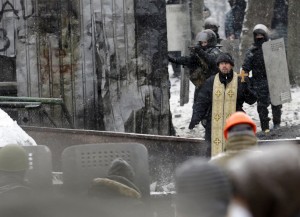
Suscipiendus autem in oratorio coram omnibus promittat de stabilitate sua et conversatione morum suorum et oboedientia.
Upon admission, in the oratory, before all, he is to make a promise to stability, conversion (of behaviour/morals/life) and obedience,
For me the Rule of St. Benedict is a guiding document for the balanced life of discipleship, whether you take vows or not. As the New Monastic movement evolves and emerges I am finding it interesting to observe the different commitments and the different Rules that are being lived out. I wonder whether there might be room for a generally accepted shape to the life of New Monastics (in contrast to the traditional monastic life) whilst giving space for contextual charisms and callings to be expressed too. I wonder whether there are some key principles around which different communities can gather and be shaped by and for the living out of those principles to be changeable to assist the different expressions across the country/world.
What follows is a hypothetical outworking of potentially using the phrases used in St Benedict’s Rule; the vow to stability, conversion and obedience.
Stability
The famous vows to ‘poverty, chastity and obedience’ are not explicit in the Rule of St. Benedict but the seed for these vows can be seen in St. Benedict’s choice of vows to ‘stability, conversatio murum and obedience’. I have already spelt out a possible correlation between these two sets of vows. In my framework stability is akin to chastity.
Stability is about faithfulness, commitment in relationship. This is absolutely key in living out a counter cultural life in a world where individual freedom is increasingly the central tenet in our society. Committing to another person or people no matter what comes with the baggage of historical examples of cults, abusive relationships, etc. and so is shied away from or seen negatively. Relationships are increasingly seen as good things until they ask you to hand over personal freedom.
Our society has a big problem with relationships. The whole topic is confused with different socio-political and philosophical wordlviews using the same language to describe completely different concepts. How Scripture describes loving relationships and covenants is very different to our view of more contractual, secular view of relationships and add to that the capitalist, consumer, neo-liberal and liberal political philosophy into the mix and it is no surprise that marriage and sexuality are such explosive conversations at the moment.
The English Benedictines released a very good video recently outlining the life of Benedictine monks. In the first part of this video Dom. Alexander Bevan discusses stability. He says,
In the first place, monastic consecration involves ‘stability’; persevering in the monastic life in a particular community. Stability, here, is connected to the people rather than to the place. (Dom. Alexander Bevan, To Prefer Nothing to Christ Part 1 – Consecration, English Benedictines, https://vimeo.com/153230237)
This commitment to others, persevering with them despite pain and heartache is picked up by Brian C. Taylor. I am indebted to Taylor for his insights into these Benedictine vows. On stability, he writes,
The Benedictine vow of stability is a vow to a community of people… In this sense it is a marriage…The grass is not greener “over there”: one must work out one’s problems with this person because, if one doesn’t, one will have to work it out with that person. This is precisely what is so freeing about the vow of stability, both in monastic life and family life. To have to work it out is to demand growth, as painful as it is, and that is freeing. Faithfulness is a limit that forces us to stop running and encounter God, self, and other right now, right here. (Brian C. Taylor, Spirituality For Everyday Living: an adaptation of the rule of St. Benedict (Minnesota: The Liturgical Press, 1989) p.17)
There is some richness in referring to a married partner as ‘the ball and chain’ (Sorry Mrs. Lunn!) because on a spiritual level that is what they are. Being bound to that person with no escape route is what gives the freedom outlined above. Yes, life-time commitments are incredibly risky; rife with potential pain and abuse. I’m not painting married life as glorious technicolour. There is an overly romantic vision of marriage which, although no one admits to agreeing with, still shapes our expectations.
There is a similar romantic vision of the monastic life which many see New Monastics as inhabiting. I’ve been told that what I want is ‘to have my cake and eat it’. There is the suggestion that those of us discovering this new monastic call are implanting a subjective, consumerist approach to the monastic life; choosing for ourselves the parts we like and are comfortable with and disregarding or reinterpreting the parts we don’t. This is a fair concern and one that I have wrestled with over the last six years.
All I know is that for me, I see the life discovered by the monastic saints of old and outlined in the Rule of St. Benedict and others as the stimulus for the holy life of discipleship. I am convinced that Dietrich Bonhoeffer, in his prison cell, began to see what St Odo, St Bernard, Martin Luther and many others saw as the failings of the monastic life (cut off and divorced from ordinary life) and the continued potential of that same life (deep discipleship and transformation). I believe that his unfinished book that he was working on at the point of his execution was an exploration and teaching on birthing a new ecclesiology and, therefore, a new missiology for a post war world.
The commitment to seek stability is rooted in the knowledge that we humans balk at pain and heartache. We learn and train ourselves to accept it as part of life and avoid it. The Church of England is learning to live out commitment and stability in a world crying out for more schisms, polarisation and chaos. The recent decision by the Primates a few weeks ago was another example at how trying to work out commitment and faithfulness in pain and heartache is met with frustration by our culture. The alternative was to choose sides and divide. A vow to stability is about disagreeing well and in humility.
Practical
So what might stability look like in different contexts across the New Monastic Movement?
I want to try and contain these suggestions into broad categories: sodal, modal and nodal categories. I won’t be outlining what it looks like in traditional monastic communities as they will know how they do that!
Sodal
Sodality comes from the Latin root, Sodalis. This can be translated comrade, or using other words, all of which suggest closeness and active partnership: companion, associate, mate, crony, accomplice, conspirator, are all listed. Sodalitas was used for social and politics associations; religious fraternities; electioneering gangs (an interesting take on mission); and guilds. (Church Army, “Why Modality and Sodality thinking is vital understand future church”, 5th January 2016, http://www.churcharmy.org.uk/Publisher/File.aspx?ID=138339)
Sodal communities ask for an explicit commitment. They are communities made up of people who share a passion or desire to work on a particular task and forge new things. In religious terms they are usually spirituality and/or missional groups. Usually sodal communities are task orientated. This is not to say that there is no emphasis on relationships with others; in fact, most of these communities are highly relational but there is a purpose around which they gather.
Stability within these have been, on the whole, self-enforcing. People commit because they want to and that commitment is taken very seriously and is tested before entry to it happens. When there is a breakdown of relationship, however, people can move and many do. Some stay but become more task-orientated and there is space for that within many sodal communities. Those that leave can be tempted to set up a new expression of the community, either taking the name and visionary principles just with different people, or create their own association where they can have more autonomy and/or correct mistakes of the original group.
A vow to stability would fit neatly into many of these gatherings and would challenge members at the point of relationship breakdown. In order to limit the community with enforced stability, a group would need to adopt reconcilers/facilitators who will help to heal the pain and difficulties brought about in tough pastoral situations. The practice would need to be worked out within the group contextually.
The entry to these groups would change, no doubt, if the vow to stability was adopted. Not everyone is comfortable or ready for this level of commitment and so noviciate/discernment phases would need to be included. These processes will already be present in sodal groups and the explicit vow to stability would encourage sodal groupings not subtly morph into more modal expressions of community.
Modal
Modality comes from the root word mode. This in turn refers to the customary way things are done. One might say it is the default position, or prevailing fashion or custom. Mathematically modal is the greatest frequency of occurrences in a given set, and there is a corresponding sense socially that it is the most common way things are…Modal church tends to make minimal demands upon its members.(ibis.)
In Anglican terms, the parish is the modal community. Modal communities primarily sustain what is there. The comparison between Petrine and Pauline ecclesiology aptly depicts the difference between modal (Peter and Jerusalem Church) and sodal (Paul and Missionary Church). The Fresh Expressions Network is made up of sodal communities and they are now seeking to connect them into modal communities. It is this marrying together that many are suspicious and cautious of. At the heart of this disconnect, I think, is a feeling from sodal communities that modal communities are maintaining the status quo which is no longer sufficient at evangelising and spreading the gospel. There may be some truth in that view but it is by no means completely accurate. many modal communities are proving to be good soil for new converts and transformation of life.
The truth is many sodal communities are becoming modal as they seek to sustain the initial impetus of their grouping even if it was some ten or fifteen years ago. There is great pressure to continually change and reinvent to keep that novelty energy going and so many formalise and become modal. Likewise, many modal communities, in desperation to remain relevant and competing with the fervour of sodal alternatives adopt many sodal practices. Whereas sodal looks to conversion for church growth, modal looks at organic church growth through maintaining families and/or relying on people moving to the area and joining.
Stability within the modal (mainly parish) is more tricky. Modal is almost defined by the soft edge, non-explicit commitment of members. I would argue that my exploration into Parish Monasticism has unearthed the need for more sodal practices to be adopted whilst maintaining the historic and strength of modality. It is the balancing of these that I am advocating. More conversation would be needed about how to adopt these structures whilst not losing the heart of parish mission and ministry. How do you develop an explicit, committed core without excluding visitors and spiritual seekers? This is already being wrestled with in most parishes. Could the monastic life not help discern possible solutions with the use of vows/aspirations?
Nodal
Nodal communities are hubs/ connecting groups. In many ways the New Monastic Movement is looking at becoming nodal and bringing together different groups. In this sense what has been discussed above fits in here as both modal and sodal gather into nodal groupings.
Stability for nodals is about commitment to dialogue and respect. Like the Anglican Communion Worldwide this not about centralising power but about relating and supporting one another. To be connectors, however, there will need to be arbitration policies in place to protect against disagreements and divisions but this is where a shared Rule of Life, allowing space for unique expressions to be worked out contextually whilst holding together in commonality.
Stability for religious nodal communities must come from a deep understanding of the Trinity. Stanley Hauerwas’ trinitarian ethics is key, I feel, to expressing a way forward for the New Monastic movement in this country. Using John Milbank’s view, set out in ‘Theology and Social Theory’, Hauerwas sates,
the Christian faith owes no allegiance to the idea of the univocity of Being, which can only uphold difference coercively and violently, but is instead moved by a trinitarian understanding of God, an absolute that is itself difference, inclusive of all difference, and thus able to affirm difference in a peaceful manner. (Stanley Hauerwas, Performing the Faith: Bonhoeffer and the practice of nonviolence (London: SPCK, 2004) p. 87)
We should not fear homogenising the different missional communities by bringing them together under one umbrella grouping. If the said grouping is explicitly trinitarian in its understanding of membership then difference can be contained within it but there needs to be a singularity in Being as well. For me the vow to stability enables the discovery of that mystery to happen because inhabiting the life of the Holy Trinity is going to involve suffering.

 …Ok. Since I wrote that reflection there has been a growing sense of some footing being lost amongst us. We have felt, at different moments, that we have lost our way or the passion has waned. This has been due to various small events in the life of our community which have combined to create not a destruction or a despair but a niggle, a question to arise: what are we doing?
…Ok. Since I wrote that reflection there has been a growing sense of some footing being lost amongst us. We have felt, at different moments, that we have lost our way or the passion has waned. This has been due to various small events in the life of our community which have combined to create not a destruction or a despair but a niggle, a question to arise: what are we doing? A wise brother amongst us wrote a deeply honest and profound response to my call for a discussion. He named the beauty of Burning Fences as ‘a clearing’. He writes,
A wise brother amongst us wrote a deeply honest and profound response to my call for a discussion. He named the beauty of Burning Fences as ‘a clearing’. He writes, This is our quest: to inhabit, together, No-Man’s Land. To share the space making no claim on it for ourselves or the parties, agendas and personal empires which we are tempted to enforce. We desire, however, to build our home there for to be at peace one must feel a sense of belonging. To what are we committing and how can that be spoken in this between place?
This is our quest: to inhabit, together, No-Man’s Land. To share the space making no claim on it for ourselves or the parties, agendas and personal empires which we are tempted to enforce. We desire, however, to build our home there for to be at peace one must feel a sense of belonging. To what are we committing and how can that be spoken in this between place?